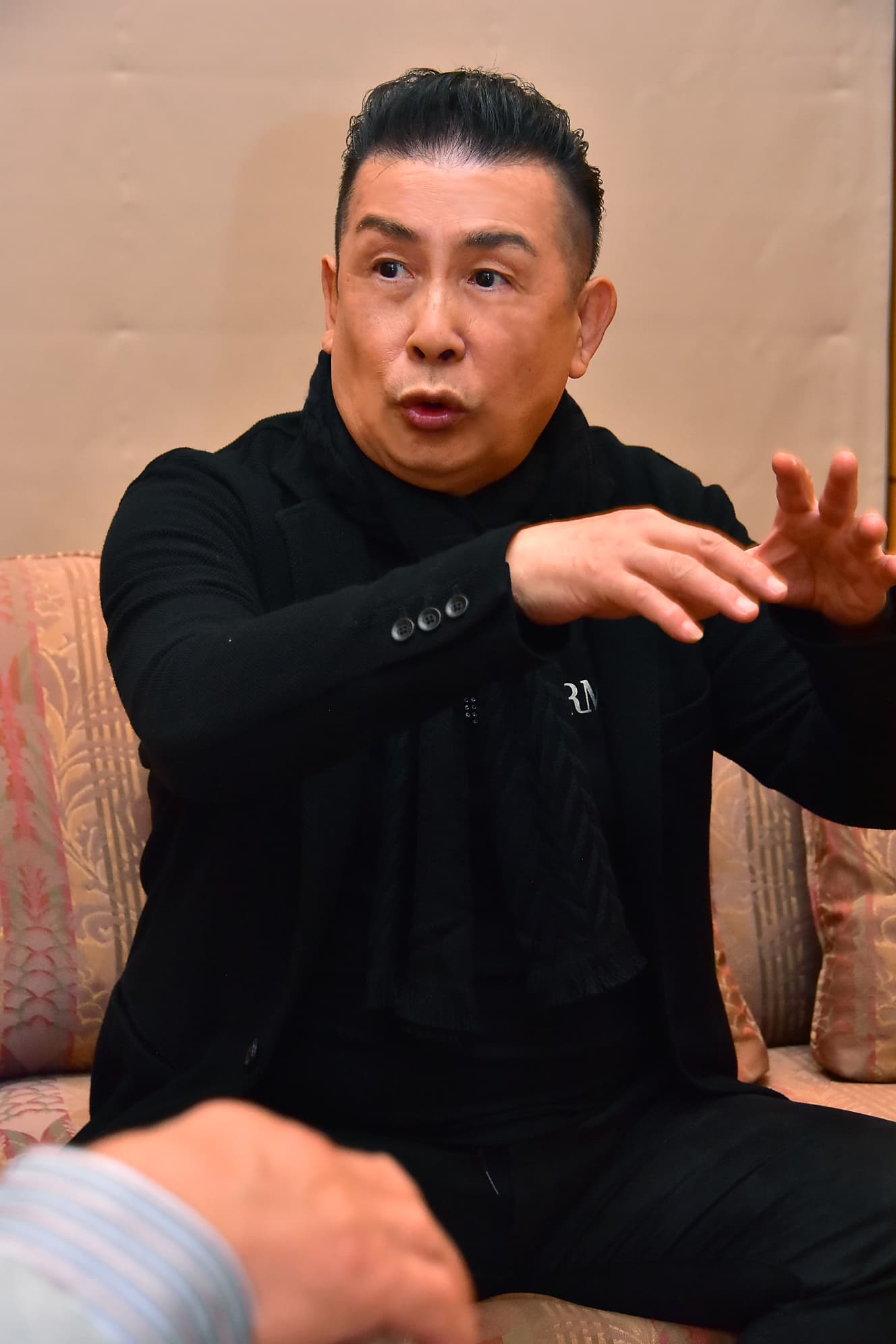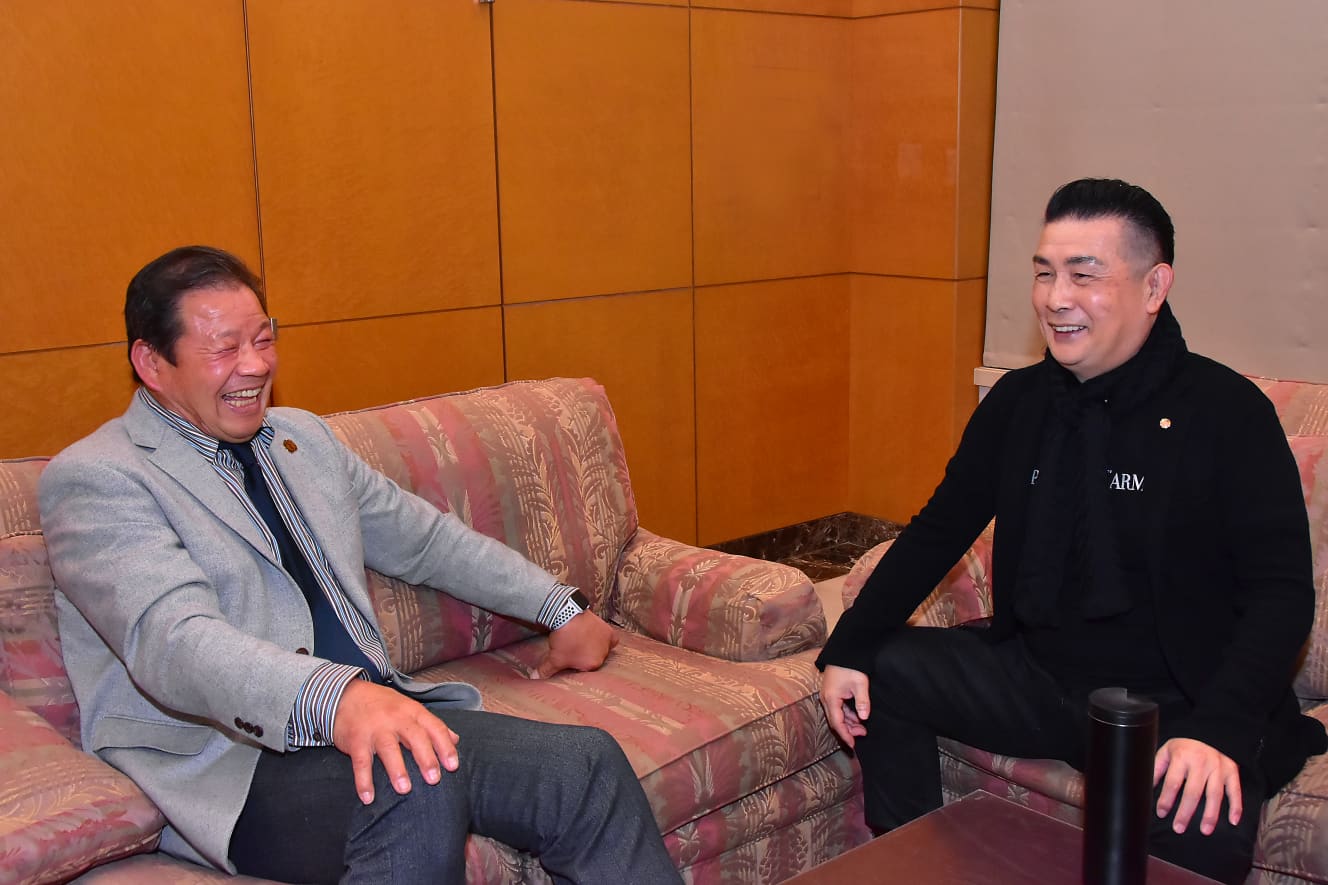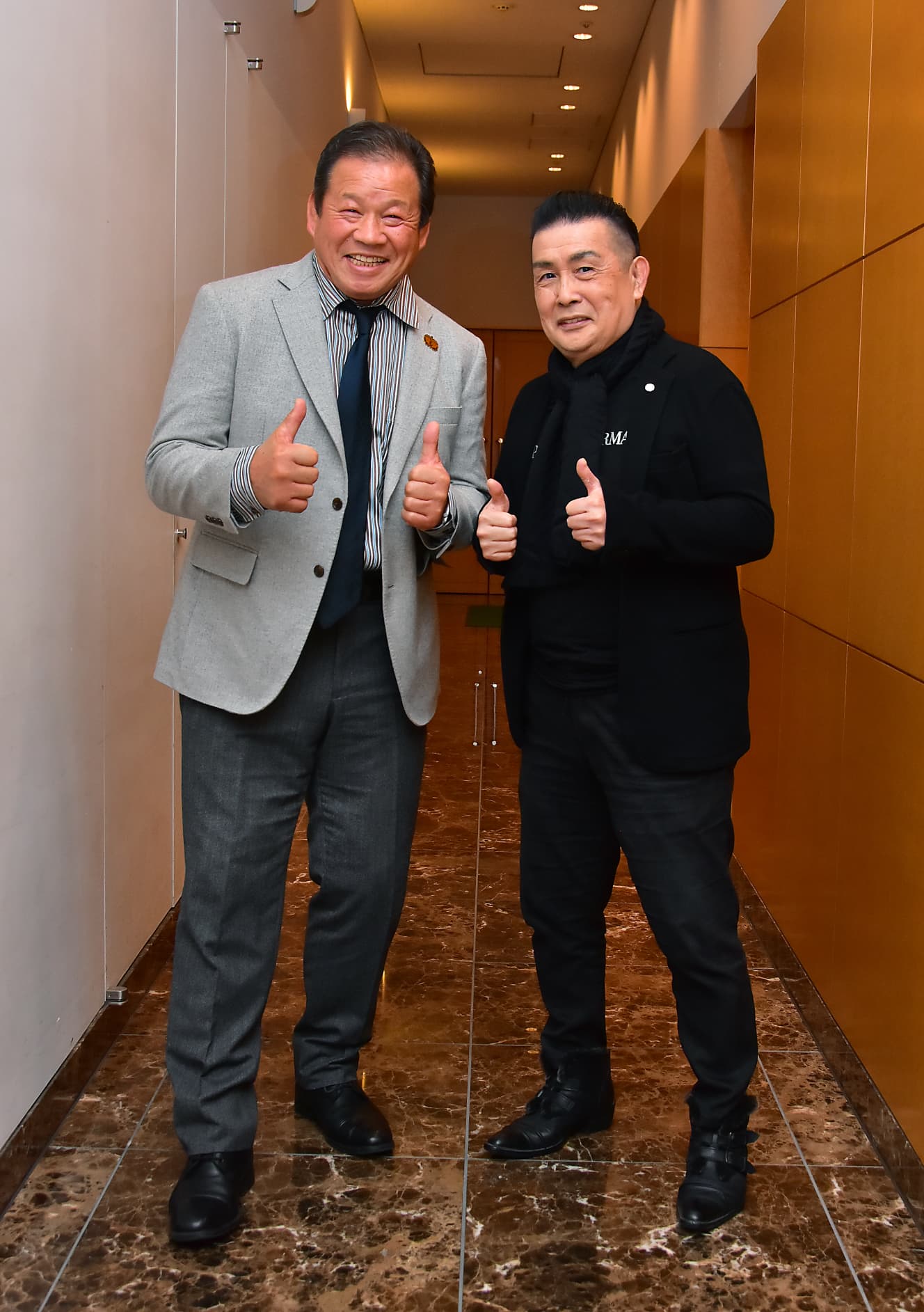Talk between classmates! Tatsumi Fujinami & Hiroshi Kadokawa: “How to fight vigorously even with Covid-19 disaster”

The new coronavirus has been rampant since the spring of 2008. In 2010, the threat posed by the Omicron Variant will only increase.
One of the industries most affected by the Covid-19 scare was the entertainment industry and martial arts. Among those who overcame the unprecedented disaster were Tatsumi Fujinami, a star in the world of professional wrestling, and Hiroshi Kadokawa, a major figure in the world of enka.
Fujinami celebrated the 50th anniversary of his debut and participated in New Japan Pro Wrestling’s “WRESTLE KINGDOM 16” at Tokyo Dome on January 4. On January 4, Fujinami participated in New Japan Pro Wrestling’s “WRESTLE KINGDOM 16” at Tokyo Dome. The crowd was excited to see him, the only active member of the New Japan flag-raising team.
Kadokawa, on the other hand, appeared on many singing programs during the year-end and New Year holidays. His song “Shijo Kawaramachi,” released in October last year, has been No. 1 on the Radio Japan Enka Chart for eight consecutive weeks since its release. In the DAM/JOYSOUND Karaoke Enka Ranking, “Shijo Kawaramachi,” which was released in October of last year, ranked among the best songs of the past, making it an exceptional hit despite the Covid-19 disaster.
This 68-year-old “active” classmate talks about the hardships he faced when he made his debut, the ins and outs of the Covid-19 disaster entertainment business, and money. He also talked about his future prospects.

Fujinami: It seems a bit telegenic in a formal setting like this. When I think about it, we’ve known each other for about ten years.
Kadokawa: We have a mutual acquaintance, and through him, I sang at Fujinami’s 40th anniversary party 10 years ago. That was my first time. At that time, I didn’t think we were classmates. I thought you were a little older than me.
Fujinami: On the contrary, I thought Mr. Kadokawa was older than me (laughs).
(laughs) Kadokawa: We used to travel together as a family to Niigata and Kawaguchiko on Mr. Fujinami’s bus. At that time, I realized that we were classmates. Moreover, our birthdays are only three days apart.
But Fujinami was a step ahead of me in entering the world. After graduating from junior high school, he entered the Japan Pro-Wrestling Association to realize his dream of becoming a professional wrestler…
Fujinami: I wanted to be a professional wrestler when I was in the second year of junior high school. But I told my teacher that I wasn’t going to go on to high school, so I got really angry. My parents were also against me. Because I don’t have the personality to do martial arts myself. I’ve never been in a fight, and I don’t like to fight with other people.
Kadokawa: Oh, is that so?
Fujinami: Even though I have such a personality, I started watching wrestling just to see something scary, and I started to like it more and more. However, I had no experience in judo or karate. So I just barged into Japan Pro Wrestling.
Kadokawa: Did you get paid for that?
Fujinami: No, I didn’t…
Kadokawa: It used to be that all you got was a place to sleep and something to eat.
Fujinami: Younger members ate in the big room, but the older members stood behind them. It was very intimidating.
Kadokawa: I know that scene (laughs).
Fujinami: “Eat your food, you! Drink up!” And they poured a lot of alcohol into the bowl. It’s definitely not allowed now, but I was 16 years old, but I had to drink. But I didn’t feel like I was being bullied or anything, I just thought, “That’s just the way it is.
Kadokawa: If you don’t accept it, you can’t move forward. But did you ever think of quitting because it was too hard?
Fujinami: No, not at all. At that time, going back to my parents’ house was not a disgrace, but it meant I couldn’t go back to my parents and siblings. That’s why I didn’t have the courage to say “I quit”… By the way, Kadokawa-san, when did you decide to become a singer?
Kadokawa: I became a club singer when I was 18 or 19 years old after graduating from high school. I didn’t have a job that suited me. I got a job at a clothing store, but I couldn’t recommend clothes to customers that didn’t even look good on them. I would say, “It doesn’t suit you” (laughs).
Fujinami: I didn’t feel like I was getting a job when I entered professional wrestling. I didn’t care how much fight money I would get, I just wanted to wrestle. That’s why I was so happy when my debut was decided. My senior wrestlers made me my first pair of ring shoes as a kind of “celebration”. I even wore them to bed. But when I first debuted, I lost a lot of fights. I didn’t have any peers, so I only had my seniors as opponents, but I had no idea when I lost, and I barely remembered. After the fight, I had bumps here and there…
Kadokawa: Mr. Fujinami entered the sport with the feeling of “I’m going to wrestle! but I wasn’t aiming to debut as a singer. I didn’t have a job, so I joined a club where my cousin was a singer. Singing and getting paid is such an easy job. I was like, “I want to do that.
Fujinami: Were you confident in your singing?
Kadokawa: When I heard other singers singing, I thought, “How can you be a club singer with that level of confidence? I thought. In the old days, when there was no karaoke, bands would come and sing at town festivals, and my father was a good singer. My father was good at it, and the neighbors said, “Your son is good, too.
Fujinami: It’s in the blood, isn’t it (laughs)? When I was young, I once sang a song. At that time, it was popular for athletes to sing, and Jumbo Tsuruta also sang. I had one AP and two singles, but I realized how good I was. It’s a good memory for me… (laughs). (laughs) When I think about it now, I feel sorry for the composers. I had great composers like Yukinojo Mori and Masayuki Yamamoto.
Kadokawa: I wouldn’t have been able to ask them either (laughs).
<One of Fujinami’s most famous songs is “Macho Dragon” (lyrics by Yukinojo Mori), which became his entrance song. In addition, “GOGO DRAGON” (lyrics by Masayuki Yamamoto) and “Dragon Gymnastics” were also released. The impact of his unique singing voice was so great that it became a topic of conversation among people other than wrestling fans.
Kadokawa, on the other hand, debuted with “Nada Gurashi” in 1976. That year, she won the Japan Record Award and the Japan Cable Award for Best New Artist… >.

Kadokawa: You’ve become a club singer. But I never had any intention of making my debut. That’s why I turned down scouts when they came. At first, I worked as a boy or behind the scenes, and I got paid for that, but I didn’t get paid as a singer. After that, the first paycheck I received as a singer was about 100,000 yen. It was around 1975. I think the starting salary for salaried workers was around 60,000 yen or 70,000 yen back then.
Fujinami: The first salary I received was 27,000 yen. I hadn’t made my debut yet at that time. I received more pocket money from Mr. Inoki than my salary.
Kadokawa: When I was singing in Hakata before my debut, I was getting about 300,000 yen a month. I also had about one million yen a month in tips. That’s why I turned down scouts many times. I didn’t want to give up the money I was making to go there (laughs). (laughs) But the person who helped me said, “If it doesn’t work out, you can always come back,” so I went to Tokyo with a light heart. I made my debut in April of the following year, and won the Newcomer’s Award at the Record Awards that year. So, I didn’t have any difficulties at all. Really.
Fujinami That’s amazing. I came back to Japan from the U.S. to do a triumphant performance, and I made about the same amount as Mr. Kadokawa. At that time, it was how much a match cost, and it wasn’t an annual salary system like now. When I made my debut, it was something like 5,000 yen per game.
Kadokawa: By the time you were 18, were you already fighting hard?
Fujinami: I moved to New Japan and fought every day. The most I did was about 260 matches a year. If I took a break, I wouldn’t get paid, so I was forced to go out even if I was in pain. That’s why I ended up with a bad back, and I ended up in a lot of trouble later on.
Kadokawa: When did you realize that you could do it as a professional?
Fujinami: It was after I went abroad. I didn’t know anything about martial arts when I started, so I had to learn from my seniors. I had a mentor in the U.S., Carl Gotch, and I went there in 1975 to learn the basics of martial arts for the first time.
Kadokawa: How long did you stay overseas?
Fujinami: About four years. I didn’t feel much hardship at all. Ever since I was a kid, it was my dream to become a wrestler and go abroad. But back then, it was a one-way ticket, and I had to train until I was told to come back. I was called back to Japan after winning the belt at Madison Square Garden in New York, but if I hadn’t won anything, I would have been wandering around for a long time (laughs).

Since there was no support from Japan, Fujinami spent his days going from city to city, selling his own fights and negotiating his own salary. However, when he returned to Japan in 1978 after winning the WWWF Junior Heavyweight Championship in New York, the “Dragon Boom” started.
Fujinami: No one saw me off when I left, but when I arrived back at Haneda Airport, there were a lot of media there. Of course, the company had arranged it, but I didn’t know what was going on, so I just turned my head to see if there were other big-name artists from overseas on the same plane. In those days, TV was a big influence, so wherever you went, fans would follow you. When I got in the ring, I knew that there were people who came to support me. That made me happy, but it also put a lot of pressure on me.
Kadokawa: Fujinami-san became a professional wrestler because he wanted to be, but I became a singer because I didn’t want to be (laughs). (laughs) Because I had money even if I didn’t make my record debut. So I thought I’d save up and open a store. I thought, “Why do I have to work so hard to make my debut as a singer? There was no guarantee that it would sell, and it was like winning the lottery. In that sense, I think I won the “petit lottery. It’s great to have a good office. It must have been a big deal for you to work for Shinnichi.
Fujinami: I joined Nippon Pro-Wrestling, but I was a founding member of Shinnichi.
Kadokawa: Well, I guess I’ll find out when I die whether it was good for me to be a singer like this. If you were still a club singer, you might have built a building in Hakata. You never know where people will end up. The singing world and the wrestling world were more glamorous and larger in scale in the past. But now there are no more concerts because of the Covid-19 disaster, and you lose your voice because you don’t sing anymore. I think you have been training without fail.
Fujinami: From the entertainment point of view, I couldn’t do it for a year. Last year was the 50th anniversary of his debut, but even so, we could only fill the venue halfway.
Kadokawa: Our work is meaningless without an audience, right? There are a lot of people who say, “What? What?”.
Fujinami: There are some studio matches where the matches are broadcasted only, but that is difficult for the riders to do. There is no one to tell you how much it hurts. The dojo is fine. It’s practice. But a match is different. It’s hard when there are no customers.
Kadokawa: You can’t see the reaction of the audience when you’re broadcasting. It makes you lose tension, doesn’t it?
Fujinami: In professional wrestling, both wrestlers are on the edge, and the cheers from the audience are what saves them. Without that, the pain is doubled. From now on, I won’t be able to fight as many fights as I did in my prime, but 30 to 40 fights a year is a very good pace. I want to keep getting in the ring in my own way for the fans who come to see me. I know it sounds strange, but I think it’s partly for my own health. It’s a sport that takes a toll on the body, but in order to get in the ring, you have to work out, and I’m definitely working my way up to 70.
Kadokawa: I try not to set goals. If I make goals, they become too narrow. You have to deal with what comes your way. It’s like in professional wrestling, you have to deal with what comes your way. That’s how I feel. I want to sing in front of my fans as long as I can keep my voice.


PHOTO: Takeshi Kinugawa (Interview)